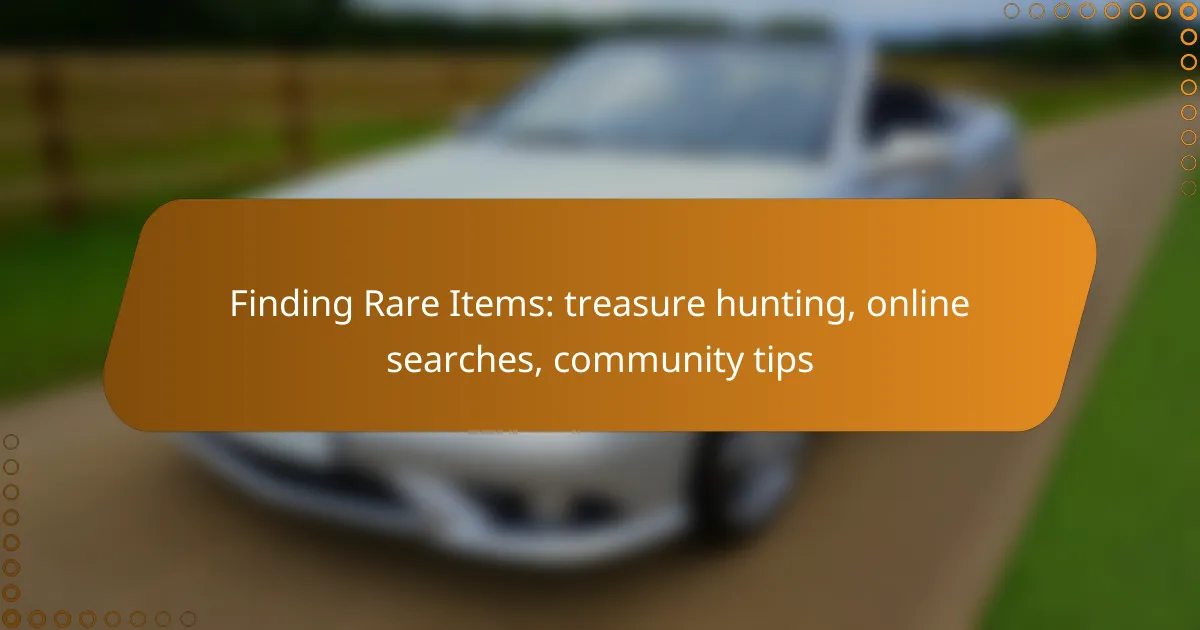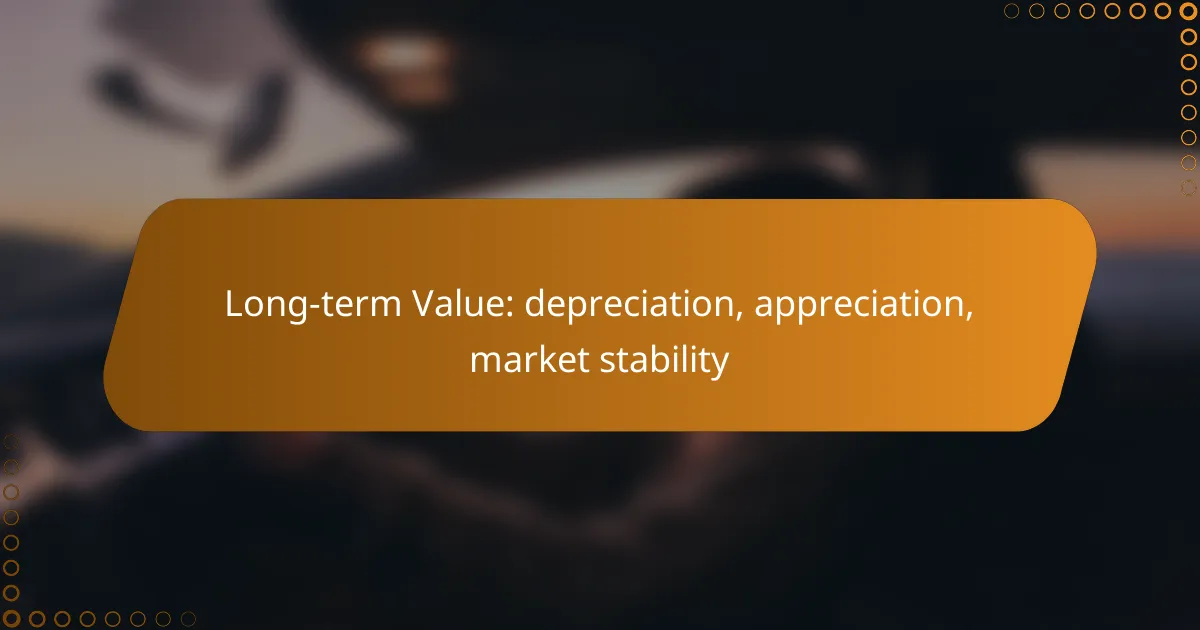Finding rare items can be an exciting adventure that combines online searches, local exploration, and community engagement. By employing targeted search strategies and connecting with fellow treasure hunters, you can enhance your chances of uncovering unique treasures. Tapping into local knowledge and shared experiences can provide invaluable insights into the best places and methods for successful treasure hunting.
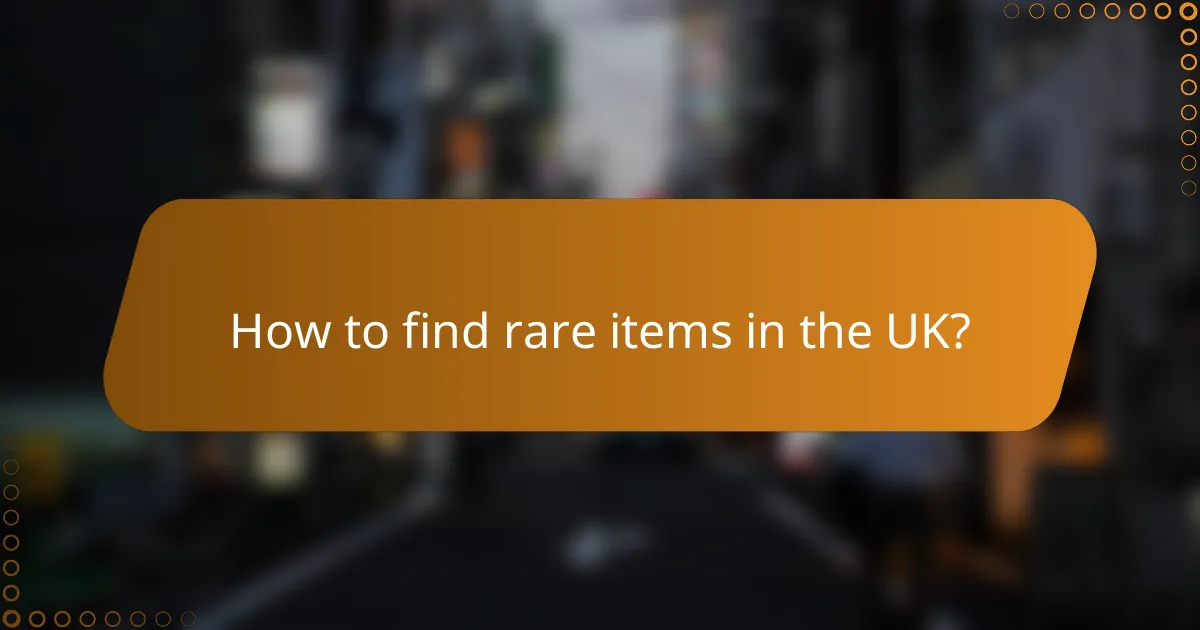
How to find rare items in the UK?
Finding rare items in the UK involves a combination of online searches, exploring local shops, and leveraging community knowledge. By utilizing various resources, you can increase your chances of uncovering unique treasures.
Utilize online marketplaces like eBay
Online marketplaces such as eBay are excellent platforms for finding rare items. You can search for specific keywords, set alerts for new listings, and even bid on auctions to secure unique finds. Be sure to check seller ratings and reviews to ensure a trustworthy transaction.
Consider using filters to narrow down your search by location, price range, and item condition. This can help you find rare items that are more accessible and within your budget.
Visit local antique shops
Local antique shops often carry a diverse selection of rare items, from vintage furniture to collectible memorabilia. Take the time to browse and ask shop owners about their inventory, as they may have hidden gems not listed online.
Building relationships with shop owners can lead to insider tips on upcoming sales or new arrivals. Regular visits can also help you spot items before they are purchased by others.
Explore charity shops and thrift stores
Charity shops and thrift stores can be treasure troves for rare items at affordable prices. These shops often receive donations of unique goods, including vintage clothing, books, and home decor. Check back frequently, as inventory changes regularly.
When shopping at these stores, look for items that are in good condition and have potential value. Don’t hesitate to negotiate prices, especially if you’re buying multiple items. Remember, the thrill of the hunt is part of the experience!
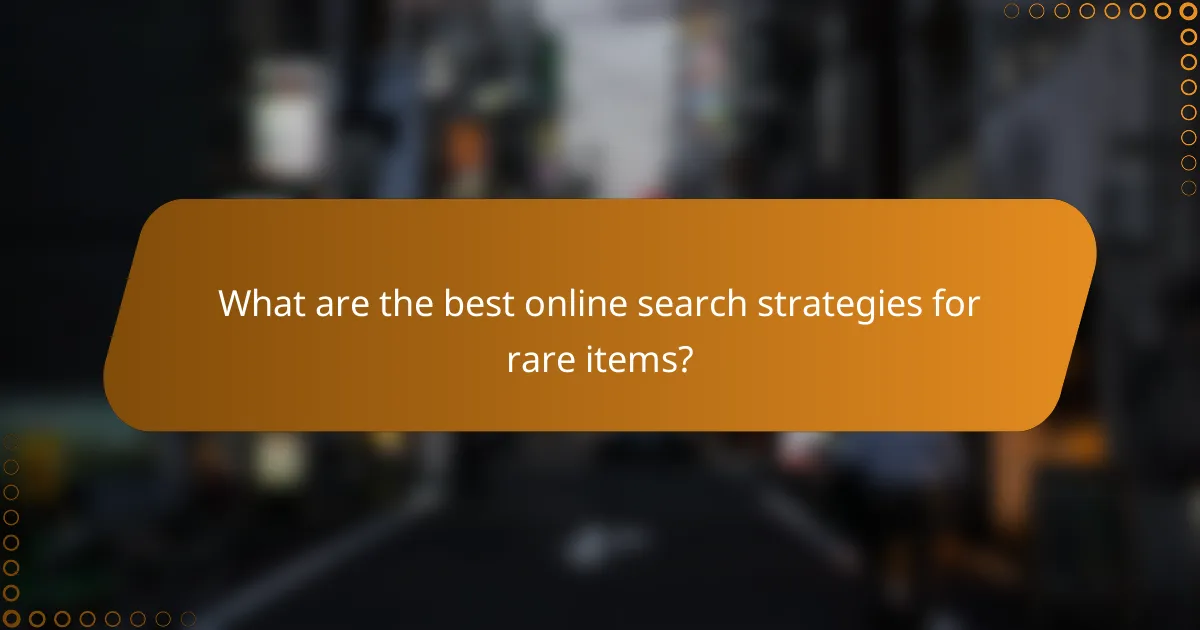
What are the best online search strategies for rare items?
The best online search strategies for rare items involve using targeted keywords, setting up alerts, and leveraging community resources. These methods help streamline the search process and increase the chances of finding unique treasures.
Use specific keywords and filters
When searching for rare items online, using specific keywords and filters is crucial. Instead of generic terms, include detailed descriptions, brand names, and item conditions to narrow down results effectively. For example, instead of searching for “vintage watch,” try “vintage Omega Seamaster automatic watch.”
Utilizing filters such as price range, location, and item condition can further refine your search. Most online marketplaces allow you to sort results by relevance or newest listings, which can help you spot rare finds more quickly.
Set up alerts for new listings
Setting up alerts for new listings is an effective way to stay informed about rare items as they become available. Many platforms, like eBay or Etsy, allow you to create alerts based on your specific search criteria. This way, you receive notifications immediately when a matching item is listed.
Consider using multiple platforms to maximize your chances. Each site may have different sellers and unique items, so diversifying your alerts can lead to more opportunities. Regularly check your alerts and act quickly, as rare items can sell fast.
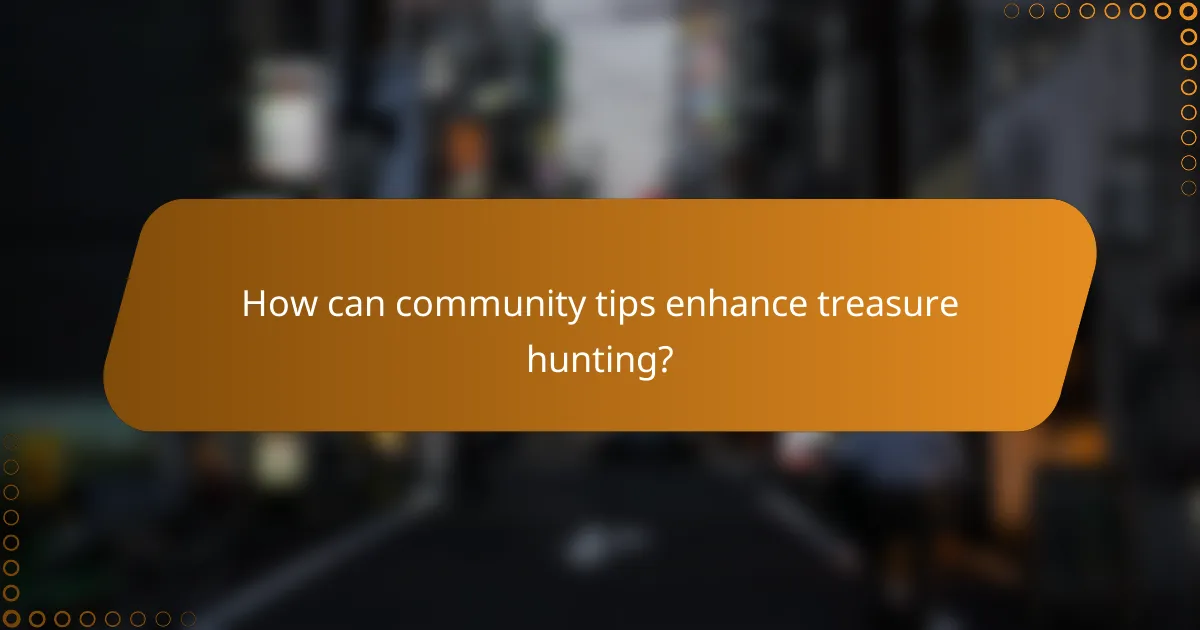
How can community tips enhance treasure hunting?
Community tips can significantly improve treasure hunting by providing valuable insights, local knowledge, and shared experiences. Engaging with fellow enthusiasts allows hunters to learn about the best locations, tools, and techniques for finding rare items.
Join local treasure hunting groups
Joining local treasure hunting groups can connect you with experienced hunters who know the area well. These groups often organize outings, share tips on the best places to search, and provide access to specialized equipment.
Look for groups on social media platforms or community boards. Many cities have clubs that meet regularly, allowing members to exchange knowledge and experiences, which can lead to more successful hunts.
Participate in forums like Reddit’s r/TreasureHunting
Participating in online forums such as Reddit’s r/TreasureHunting can broaden your understanding of treasure hunting techniques and strategies. These platforms allow users to ask questions, share finds, and discuss the latest tools and technologies.
Engage actively by posting your own experiences and seeking advice on specific challenges. This interaction can lead to discovering new hunting spots and learning from the successes and failures of others in the community.
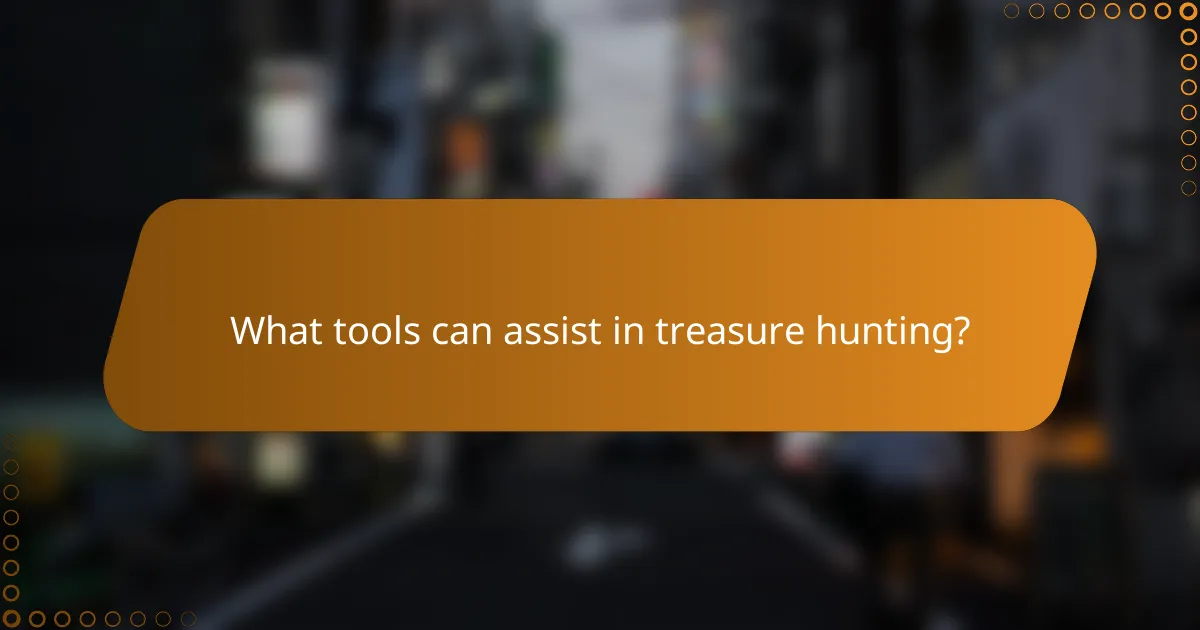
What tools can assist in treasure hunting?
Several tools can enhance your treasure hunting experience, including metal detectors and smartphone apps. These tools help you locate, track, and manage your finds effectively.
Metal detectors like Minelab Equinox 800
The Minelab Equinox 800 is a versatile metal detector favored by many treasure hunters for its advanced features and ease of use. It operates on multiple frequencies, allowing users to detect a wide range of metals, from coins to relics.
When using a metal detector, consider the terrain and the type of items you are searching for. Adjusting settings such as sensitivity and discrimination can significantly improve your chances of finding valuable items. Always check local regulations regarding metal detecting, as some areas may require permits.
Smartphone apps for tracking finds
Smartphone apps designed for treasure hunting can help you log your finds, track locations, and connect with other enthusiasts. Apps like “Treasure Hunter” and “Finds” allow users to record details about their discoveries, including GPS coordinates and photos.
Using these apps can streamline your treasure hunting efforts. They often include features for sharing finds with a community, which can provide valuable insights and tips. Be sure to regularly back up your data to avoid losing valuable information about your finds.

What are the legal considerations for treasure hunting in the UK?
Treasure hunting in the UK involves specific legal considerations that must be understood to avoid potential legal issues. The Treasure Act 1996 outlines the regulations for finding and reporting treasure, while rights on private property can vary significantly.
Understand the Treasure Act 1996
The Treasure Act 1996 defines treasure and mandates that any treasure found must be reported to the local coroner within a specified timeframe. Treasure typically includes items made of gold or silver, or any coins that are at least 300 years old. Failure to report can lead to legal penalties.
If the treasure is deemed significant, the finder may be rewarded with a share of its value, which is determined by the British Museum. This encourages responsible treasure hunting and ensures that historical artifacts are preserved for public benefit.
Know your rights on private property
When treasure hunting on private land, it is crucial to obtain permission from the landowner before searching. Without consent, you may be trespassing, which can lead to legal action. Always have a written agreement to avoid misunderstandings.
If you find treasure on private property, the landowner typically has a claim to a portion of the treasure’s value. It’s advisable to discuss how any potential finds will be shared beforehand to ensure a fair arrangement.
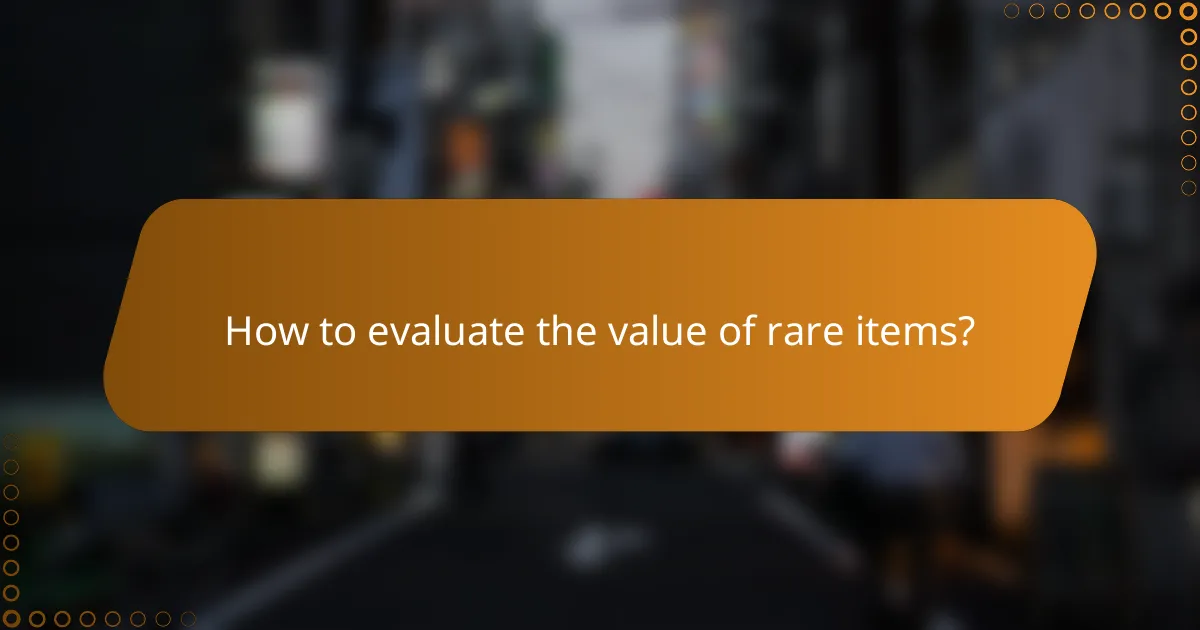
How to evaluate the value of rare items?
To evaluate the value of rare items, consider factors such as condition, provenance, and market demand. Understanding these elements can help you determine a fair price or potential resale value.
Consult appraisal services
Appraisal services provide professional evaluations of rare items, offering insights into their worth based on expertise and market trends. Look for certified appraisers who specialize in the type of item you have, as their knowledge can significantly impact the valuation.
When choosing an appraiser, consider their credentials, experience, and reviews from previous clients. Fees can vary widely, typically ranging from $50 to several hundred dollars, depending on the item’s complexity and the appraiser’s reputation.
Research recent auction prices
Investigating recent auction prices can give you a clear idea of what similar rare items have sold for in the current market. Websites like eBay, Sotheby’s, or Christie’s often provide historical auction results that can serve as a benchmark for your item.
Pay attention to the final sale prices, as they reflect real market conditions. Note that auction prices can fluctuate based on factors like seasonality and buyer interest, so consider looking at multiple sales over time for a more accurate assessment.
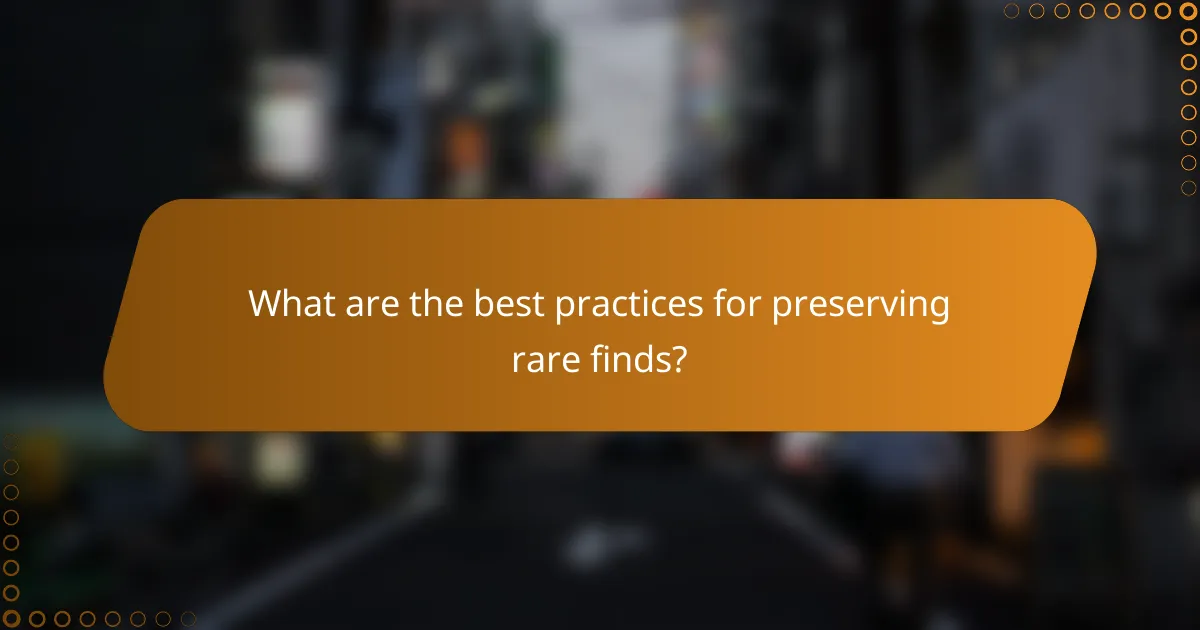
What are the best practices for preserving rare finds?
Preserving rare finds is crucial to maintaining their value and integrity. Proper techniques can prevent deterioration and damage, ensuring that these treasures can be enjoyed for years to come.
Cleaning Techniques
When cleaning rare items, it’s essential to use gentle methods that won’t cause harm. For metals, a soft cloth or brush with mild soap and water can be effective. Avoid harsh chemicals that may corrode or discolor the surface.
For organic materials like wood or textiles, dusting with a soft brush is often sufficient. If deeper cleaning is necessary, consider consulting a professional conservator to avoid damaging the item.
Storage Conditions
Store rare finds in a stable environment with controlled temperature and humidity. Ideally, keep items in a cool, dry place away from direct sunlight, which can fade colors and weaken materials.
Use acid-free boxes or archival materials for storage, as these can prevent chemical reactions that may lead to deterioration. Regularly check the condition of stored items to catch any potential issues early.
Handling Guidelines
Minimize handling of rare items to reduce wear and tear. When you must handle them, ensure your hands are clean and dry, or wear cotton gloves to avoid transferring oils and dirt.
Always support items properly to prevent bending or breaking. For fragile pieces, consider using display cases that protect them from dust and accidental contact.






